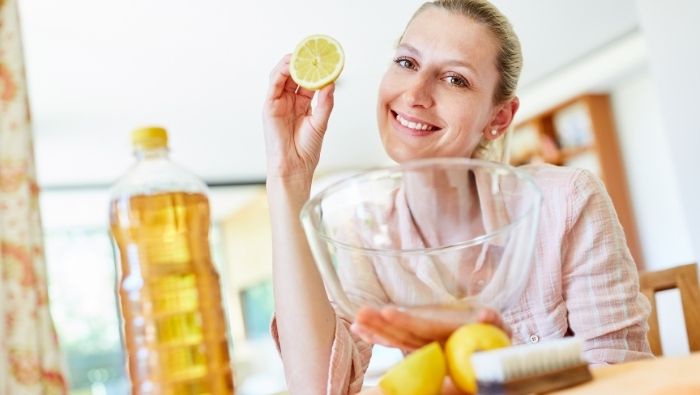Using Lemons for Health and Cleaning (and Saving Money)

It’s surprising what you can do with a simple lemon. We explore how using lemons for health and cleaning can save you money.
Grandma used to say, “When life gives you lemons, make lemonade.”
Well, lemons do a lot more than just make lemonade, and our grandmothers knew it. Along the way, we have forgotten many of the beneficial things lemons can do.
So let’s find out all the ways that Grandma would use lemons in her home.
Health Benefits of Lemons
Lemons are a natural health care remedy that are packed full of much-needed vitamins and minerals that help your body function correctly.
Lemons have vitamin A, vitamin B1, vitamin B2, vitamin B6, vitamin C, vitamin E, Niacin, Folate, and Pantothenic Acid, and as for the minerals, they have Potassium, Phosphorus, Magnesium, Calcium, Sodium, Iron, Selenium, Manganese, Copper, Zinc and a few more trace vitamins and minerals not mentioned here.
Being a citrus fruit, lemons are believed to help protect our bodies against certain types of cancers.
Drinking a cup of hot tea with fresh lemon juice and honey will help soothe sore throats and can help you feel better during cold and flu season.
Sign Up for Savings
Subscribe to get money-saving content by email that can help you stretch your dollars further.
Twice each week, you'll receive articles and tips that can help you free up and keep more of your hard-earned money, even on the tightest of budgets.
We respect your privacy. Unsubscribe at any time.
For softer skin, mix up a facial scrub of lemon juice and sugar. Rub this mixture all over your face, keeping it out of your eyes. Then rinse well with fresh water and pat dry. Your face will feel refreshed and revived, and you will look better. (See DIY Salt Scrubs for Silky Skin.)
Inhaling the fresh lemon scent is believed to help with alertness, mental exhaustion, and fatigue. Keeping a bowl of lemons on your desk will help relieve anxiety and tension. (See Free Anxiety Fixes for Tough Times.)
To incorporate lemons into your diet, drink lemon juice, add lemon to tea, top off dressings on salads with a squeeze of lemon, and squeeze lemon juice over your favorite chicken and fish meals before eating.
Benefits of Cleaning with Lemons
Instead of using toxic cleaning products in your home around your children and pets, use one of nature’s best kept secrets, namely lemons. Because lemons are a citrus fruit, they have a high content of citric acid. (See Make Your Own Cleaners and Save.)
You can get your clothes cleaner by soaking them in lemon juice mixed with warm water before washing in your washing machine.
To remove odors from your microwave and refrigerator, wash with lemon juice and warm water. After washing with the lemon mixture, rinse with clean water. If the microwave is really smelly, you can place a cup of lemon juice in the microwave and heat to boiling. The let it rest until it cools off, and your microwave will smell fresher. (See 13 Ways to Remove Odors Naturally and Inexpensively.)
Clean your coffee pot by running lemon juice through the brewing cycle. Do this several times if necessary. Then use a pot full of fresh water through the brewing cycle to thoroughly cleanse before brewing your coffee. (See 10 Things You Can Do With Leftover Coffee That Saves You Money.)
Lemons are relatively cheap compared to other fruits on the market. The best are organically grown, which does cost a bit more but it’s well worth the cost because of all the uses and health benefits. Organically grown lemons don’t have the chemicals and harmful toxins that commercially grown lemons contain.
If you have the room, you can grow your own lemon trees in your backyard and save on the cost of having to buy lemons. Usually when buying and planting fruits trees, it is a good rule to plant three at a time, space according to the growing recommendations, and plant during the season specified for your location.
Reviewed February 2024
About the Author
Dianne Tyndall is a retired Licensed Practical Nurse turned freelance journalist.
Popular Articles
- 7 Habits of Highly Frugal People
- 5 Simple Budget Cuts That Can Save $200 a Month
- How to Track Down Unclaimed Funds Owed You
- 32 Ways to Save Money on Your Utility Bills
- Do You Need Credit Life Insurance When Buying a New Car?
- How to Maximize Profits When Selling Online
- Staying Motivated to Continue Digging Yourself Out of Debt
On After50Finances.com
- 9 Things You Need to Do Before You Retire
- You Didn’t Save Enough for Retirement and You’re 55+
- When Empty Nesters Reorganize and Declutter Their Home
- Reinventing Your Career in Your 50s or 60s
- What Mature Homeowners Should Know about Reverse Mortgages
- 2 Reasons to Collect Social Security Benefits As Soon As Possible


